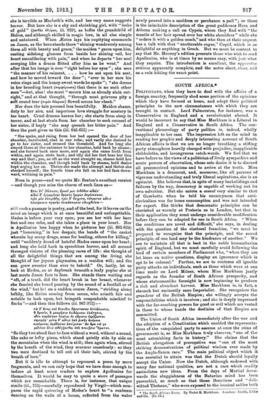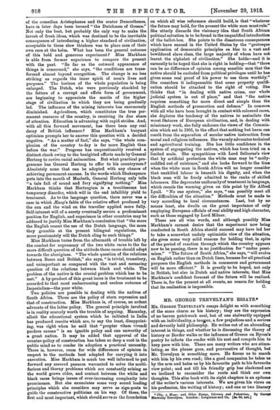SOUTH AFRICA.*
POLITICIANS, when they have to deal with the affairs of a foreign country, frequently shed some portion of the opinions which they have formed at home, and adapt their political principles to the new circumstances with which they are brought in contact. Lord Palmerston, for instance, was a Conservative in England and a revolutionist abroad. It would be incorrect to say that Miss Markham is a Liberal in England and a Conservative in South Africa. The con- ventional phraseology of party politics is, indeed, wholly inapplicable to her case. The impression left on the mind in reading her graphic and deeply interesting account of South African affairs is that we are no longer breathing a stifling party atmosphere heavily charged with prejudice, inapplicable shibboleths, and incongruous catch-words. We feel that we have before us the views of a politician of lively sympathies and acute powers of observation, whose sole desire it is to discard all preconceived opinions and to arrive at the truth. Miss Markham is a democrat, and, moreover, like all persons of vigorous understanding and truly liberal aspirations, she is an optimist. She believes that, in spite of many backslidings and failures by the way, democracy is capable of working out its own salvation. But she enters a caveat very similar to that of Gambetta when he told his countrymen that anti- clericalism was for home consumption and was not intended for export. She thinks that democratic principles can be cherished as warmly at Pretoria as in London, but that in their application they must undergo considerable modification before they can be adapted for use in South Africa. " When the conditions are novel and difficult," she says, in dealing with the question of the electoral franchise, "we must be prepared to recognize that the principle, and the sound principle, of one land may be the hindrance of another." We are to maintain all that is best in the noble humanitarian spirit of England, but we must carefully avoid following the lead of certain members of Parliament who, "when they are let loose on native questions, display an ignorance which is apt to be colossal." Further, we are to contemn all ignoble party attacks on individuals, such as those which were at one time made on Lord Milner, whom Miss Markham justly regards as the founder of South African prosperity, and whose statesmanlike foresight is now beginning to produce a rich and abundant harvest. Miss Markham is, in fact, a staunch but eminently sane Imperialist. She recognizes the grandeur of the British Empire; she willingly accepts the responsibilities which it involves ; and she is deeply impressed with the far-reaching powers for good or evil which are vested in those to whose hands the destinies of that Empire are committed.
The Union of South Africa immediately after the war and the adoption of a Constitution which enabled the representa- tives of the vanquished party to assume at once the reins of government is, as Miss Markham truly observes, "one of the most astonishing facts in history." She claims that the British abrogation of prerogative was " one of the most striking demonstrations of political wisdom ever made by the Anglo-Saxon race." The main political object which it was essential to attain was that the Dutch should loyally accept the Union. Now the Dutch, although endowed with many fine national qualities, are not a race which readily assimilates new ideas. From the days of Martial down- wards the sluggishness of the Batavian mind has been proverbial, so much so that those Boeotians and " dull- witted Thebans," who were exposed to the ironical sallies both The South African Scene. By Violet R. Markham. London: Smith, Eder of the comedian Aristophanes and the orator Demosthenes, have in later days been termed " the Dutchmen of Greece." Not only the best, but probably the only way to make the inrush of fresh ideas, which was destined to be the inevitable consequence of introducing a higher standard of civilisation, acceptable to these slow thinkers was to place men of their own race at the helm. What has been the general outcome of this bold and generous experiment ? Miss Markham is able from former experience to compare the present with the past. "So far as the outward appearance of things is concerned," she says, " the conditions are trans- formed almost beyond recognition. The change is no less striking as regards the inner spirit of men's lives and purposes." The horizon of the whole population is being enlarged. The Dutch, who were previously shackled by the fetters of a corrupt and effete form of government, are beginning to appreciate the merits of the higher stage of civilisation to which they are being gradually led. The influence of the mining interests has enormously diminished. Agriculture, which constitutes the true per- manent resource of the country, is receiving its due share of attention. Education is advancing with rapid strides. And, with all this forward movement, has there been any real decay of British influence P Miss Markham's buoyant optimism prompts her to answer this question with a decided negative. " As a matter of fact," she says, " the whole com- plexion of the country to-day is far more English than before the war." Progress has unquestionably received a distinct check owing to the benighted efforts made by General Hertzog to revive racial animosities. But what practical pro- gramme has General Hertzog to offer to his countrymen P Absolutely none that can be adopted with any chance of achieving permanent success. In the words which Shakespeare puts into the mouth of Macbeth, General Hertzog only tells "a tale full of sound and fury signifying nothing." Miss Markham thinks that Hertzogism is a troublesome but temporary disorder, which will in the end infallibly yield to treatment. As to the language question, there never was a case in which 2Esop's fable of the relative effect produced by the sun and the wind on the traveller applied more fully. Self-interest will of a surety eventually secure a predominant position for English, and experience in other countries may be adduced to justify Miss Markham's conclusion that " the more the English resent the use of the Dutch language, the more they grumble at the present bilingual regulations, the more passionately will the Dutch cling to such things."
Miss Markham turns from the aftermath of trouble left by the combat for supremacy of the two white races to the far more difficult question of the attitude those races should adopt towards the aborigines. " The whole question of the relations between Boers and British," she says, " is trivial, transitory, and unimportant as compared with the vast and menacing question of the relations between black and white. The problem of the native is the crucial problem which has to be met." A by-product of this great issue is the treatment to be accorded to that most embarrassing and useless outcome of Imperialism—the poor white.
Two policies are possible in dealing with the natives of South Africa. These are the policy of stern repression and that of construction. Miss Markham is, of course, an ardent advocate of the latter policy. The general principle involved is in reality scarcely worth the trouble of arguing. Macaulay, albeit the educational system which he initiated in India has produced results which are, to say the least, disappoint- ing, was right when he said that " propter vitam vivendi perdere causes " is an ignoble policy and one unworthy of a great nation. It may be added that approval of the counter-policy of construction has taken so deep a root in the public mind as to render its adoption a practical necessity. There is, however, room for wide differences of opinion in respect to the methods best adapted for carrying it into execution. Miss Markham is much too well informed to put forward any assured panacea warranted to solve the multi- farious and thorny problems which are constantly arising as the world grows older, and contact between the white and black races brings issues of ever-increasing complexity into prominence. But she enunciates some very sound leading principles which she considers may serve as sign-posts to guide the constructive politician on his way. Of these, the first and most important, which should serve as the foundation on which all wise reformers should build, is that "whatever the future may hold, for the present the white man must rule." She utterly discards the visionary idea that South African political salvation is to be found in the unqualified introduction of the ballot-box. She points to the disastrous consequences which have ensued in the United States by the "grotesque application of democratic principles en bloc to a vast and bewildered slave class, the large majority of whom have not learnt the alphabet of civilisation." She holds—and it is earnestly to be hoped that she is right in bolding—that "there can be no difference of opinion among sensible men that the native should be excluded from political privileges until he has given some real proof of his power to use them worthily." She considers it indispensable that some property qualifi- cation should be attached to the right of voting. She thinks that "in dealing with native crime, our whole judicial system is out of place," and that " the native requires something far more direct and simple than the English methods of prosecution and defence." In common with all who have been brought in contact with coloured races, she deplores the tendency of the natives to assimilate the worst Patures of European civilisation, and, in dealing with missionary work, she fully endorses the views of the Commis- sion which sat in 1905, to the effect that nothing but harm can result from the separation of secular native instruction from moral and religious influences. She warmly advocates technical and agricultural training. She has little confidence in the system of segregating the natives, which has been tried on a limited scale. She sympathizes with Lord Selborne's view that by artificial protection the white man may be " molly- coddled out of existence," and she looks forward to the time when the white man in South Africa will no longer consider that unskilled labour is beneath his dignity, and when the black man will be freely admitted to the ranks of skilled labourers. She deprecates uniformityof treatment in language, which recalls the warning given on this point by Sir Alfred Lyall. "No one system," she says, "can possibly meet all the difficulties of the situation." Methods must be made to vary according to local circumstances. Last, but by no means least, she dwells on the great importance of only employing European officials of real ability and high character, such as those engaged by Lord Milner.
These are all wise words, and although possibly Miss Markham's earnest desire that the experiment now being conducted in South Africa should succeed may have led her to take a somewhat unduly optimistic view of the situation, she gives some very solid reasons for holding that, in spite of the period of reaction through which the country appears now to be passing, there is no justification for "undue pessi- mism." "The future of South Africa," she says, " will evolve on English rather than on Dutch lines, because for all practical purposes the English methods in commerce and government will be more efficient." It is greatly to be hoped, not only in British, but also in Dutch and native interests, that Miss Markham's confident forecast of the future will be realized. There is, for the present at all events, no reason for holding
that its realisation is impossible. C.



















































 Previous page
Previous page